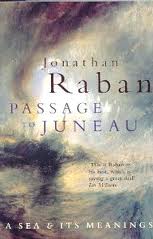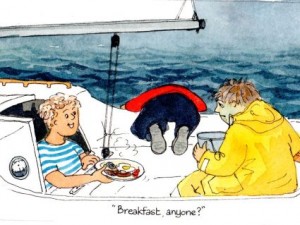Sailing on the sofa
If you had to divide sailing types into two, you’d probably say there are those who race and those who cruise. I fall firmly into the second category, having never been able to see the point of going afloat to get stressed and sail round in circles shouting a lot, just to end up at the same harbour (usually) you started in. If someone is faster then me, I will move aside to let them get past. It’s the same in life; if someone does the same as I do but thinks they do it better, then I’ll back off and let them get on with it. On the few occasions I have joined in a race, usually crewing for some tyro skipper, I must admit to having felt the tiniest flutter of excitement at the finish line – but that may have been simply anticipation of an imminent gin and tonic.
The cruising mindset I totally understand; the challenge of a passage made entirely in partnership with boat, tides, weather and your own skill satisfies the explorer in us all. It’s a shame the word ‘cruising’ has negative meanings to non-sailors – I’m not sure I dare add it to the list of tag words when I post this blog and recent events will no doubt cast a shadow over ‘cruising’ as in ‘holiday on an oversized floating shopping mall’. But to small boat sailors, cruising will always be the grand adventure even if it’s a jolly in fine weather round to the next bay.
The analogy of life as a voyage is universal and somehow reassuring; even those who have never set eyes on the sea will talk of going through stormy times, being taken aback, told not to rock the boat and advised to make a change of tack. I’ve just finished reading Jonathan Raban’s ‘Passage to Juneau’, a book that satisfies on many levels. I won’t describe it, just recommend it, but Raban is the ultimate thinking man’s cruiser – if you haven’t read his book ‘Coasting’, add that to the list.
Racing, now – that’s the spirit of adventure taking a different turn. I was lucky enough to meet Val Howells recently, at a talk he was giving locally. Val is now the only surviving competitor from the five entries in the original OSTAR in 1960; the very first single handed transatlantic race arising from a challenge laid down by the great Blondie Haslar. This was a race driven by the need to challenge the unknown, though it sowed the seeds for the multi-sponsored professionally skippered offshore races of today. Haslar’s challenge was answered by a few kindred spirits, but only four others made it to the start line for that first race. The establishment – particularly the yachting establishment – was deeply disapproving. Single handed sailing, by its nature, disobeys the most important rule in the collision regulations, keeping a good lookout at all times. To attempt such a race, said the experts, would end in disaster and bring the sport into disrepute.
Haslar and his fellow competitors, Francis Chichester, David Lewis, Val Howells and Frenchman Jean Lacombe, who set off after the start, were not the type of men to be swayed by public opinion. Small boats, big men. Literally and figuratively – and at over six foot, it is mind boggling that Howells undertook the race in a 25′ folkboat – he must have had to fold himself in half to get into the cabin. Haslar’s boat Jester was a folkboat too, modified to junk rig; the biggest boat in the fleet was Chichester’s 40′ Gipsy Moth. No handicap system was applied to the race so to some extent it was not about beating each other, it was about completing the challenge which, being the men they were, they all did – most of them coming back for more in subsequent races.
As a committed wimp who finds sailing up a muddy creek excitement enough, I am always fascinated to read tales from the more intrepid end of the seafaring spectrum. So reading Val Howell’s book ‘Sailing into Solitude’ is something to look forward to by the fire on a cold January night…. with a glass of wine in hand of course, because armchair sailors never get seasick.



Another delightful and insightful instalment Claudia
….then there’s sailing on a square rigged tall ship!!! Not to be missed in my opinion. Check my photos on facebook. That’s 75 ft. off the deck! …with the Channel Is. in the background. Arrrrrggggghhhhhh!!!!!!! Aloft and furl you scurves!!! Fair winds…. Bill
I love Raban – Coasting’s up there with Riddle, We Didn’t and Down Channel. I particularly like the fact that he derived the title from a criticism of not making enough effort at school – ‘You’re coasting, Raban, you’re coasting,’ said his teacher.
Juneau I found had intermittent passages of brilliance among stretches of hard slog. Bit like actual cruising really. Those long-distance passage races are a bit like the best of cruising and racing getting from A to B with a bit of spicing-up.
And have you now divided sailors into three kinds – racing, cruising and armchair?
Hm. I think I’m in another category again – “just sailing” – i.e. quite happy just to sail without particularly getting anywhere (although it’s nice to have that as an aim) and certainly without any need to win anything…
Creek crawling a special case in this category….
Well, if boats were dogs, I only got to the “okay Dog, where shall we walk today?” stage.